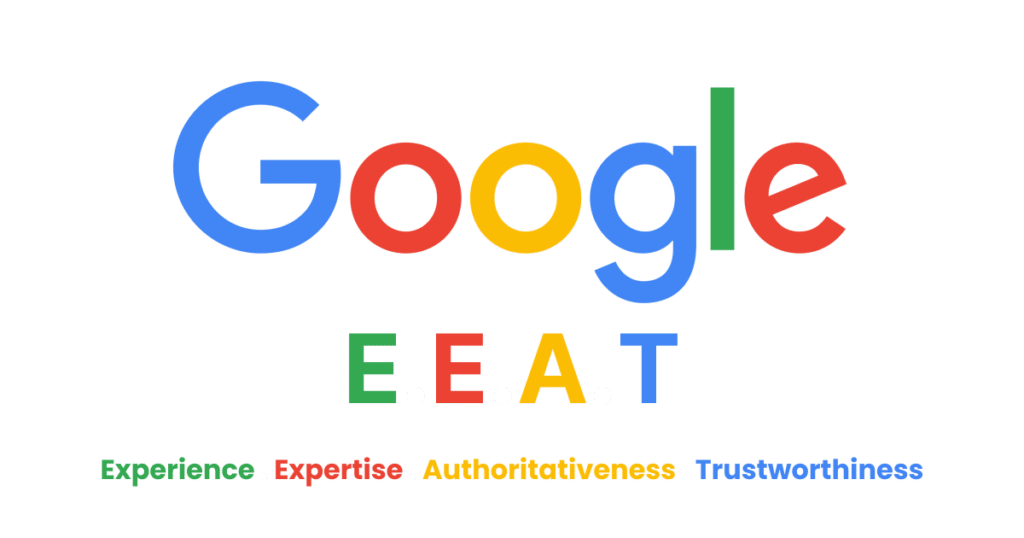Navigating the world of Google’s search engine rankings can feel like trying to catch a wave in the vast ocean of the internet. Enter Google E-E-A-T: the guiding star for boosting your site’s visibility. This acronym stands for Experience, Expertise, Authoritativeness, and Trustworthiness, and it is essentially Google’s way of saying, “Hey, we want to show our users the best and most reliable content out there.” Whether you’re a seasoned digital marketer, a savvy content creator, or just getting your feet wet in the digital marketing world, understanding E-E-A-T is your ticket to a successful SEO strategy. Let’s dive into why it’s so crucial and how it can help your website stand out in the sea that is the internet.
Breaking Down Google E-E-A-T: Your SEO Strategy Compass

Google E-E-A-T stands tall as the lighthouse guiding your website through the murky waters of the internet towards the shore of high search engine rankings. Let’s unpack these letters to understand what they mean for your website and why each component is critical to your SEO strategy.
Experience:
Google isn’t just looking for information; it’s seeking content that resonates with real-life experience. It values content demonstrating firsthand knowledge and personal insights, showing that the author or site has walked the walk, not just talked the talk. This adds a layer of relatability and trust to your content, signaling to Google that you’re offering value from actual experience.
Expertise:
Here, Google is checking for your credentials. Do you have the know-how in your field? Expertise is proof of skill or knowledge, showcasing that you’re well-versed and qualified to discuss the subject at hand. Whether through formal education, professional experience, or a combination of both, showing your expertise helps Google trust your content’s accuracy and relevance rather than just an “opinion.”
Authoritativeness:
This is about your standing in the larger web community. Are other reputable websites linking to your content? Do industry leaders recognize you as a source of reliable information? Authoritativeness is built over time through quality content, engagement, and recognition from peers and industry authorities.
Trustworthiness:
The internet is a wild west of information, and trustworthiness is your badge of honor. It’s about presenting information in a transparent, accurate, and fair manner. Trustworthiness is crucial, especially for sites dealing with sensitive topics (think health or finance). It’s established through clear sourcing, avoiding misleading information, and securing your site against potential threats.
Mastering the elements of E-E-A-T doesn’t just boost your SEO strategy; it aligns your website with the kind of quality and reliability that both users and Google value. This isn’t about tricking the algorithm but about being genuinely the best answer to your audience’s questions.
The Evolution of Google E-E-A-T from E-A-T and How It Affects You
As with anything, trial, testing, and knowledge are gained over time. This is precisely what Google has done. The original method of site evaluation was just E-A-T, where Google focused on assessing the expertise of the author, the authoritativeness of the website publishing the content, and the overall trustworthiness of both.
Introducing “Experience” into the mix acknowledges that expertise isn’t just about formal qualifications or professional accolades. It’s also about what individuals have lived through, learned from, and can share from a personal perspective. This addition highlights Google’s recognition of the unique value that personal stories and experiential knowledge bring to the table, particularly in areas where firsthand experience can offer additional depth and insight. Travel experts are an excellent example, even if they don’t have a degree in travel or work at an agency.
E-E-A-T’s significance is its acknowledgment that credibility and value in digital content come from a blend of objective knowledge and subjective experience. For website owners and content creators, this means that providing helpful, reliable, and personally insightful content can make a website stand out not only to users but also in Google’s search rankings. This evolution encourages a more holistic approach to content creation, where the goal is to meet users’ needs with a combination of authoritative information and relatable experiences.
Strategies for Showcasing Google E-E-A-T on Your Website
Navigating the Google E-E-A-T landscape requires a nuanced understanding of its impact on website content, particularly for Your Money or Your Life (YMYL) pages. These pages, which significantly influence users’ health, financial stability, or safety, are held to the highest standards by Google, making E-E-A-T a critical factor in achieving favorable rankings. So, how exactly can websites adapt to these guidelines and signal their credibility effectively?
Showcasing Experience and Expertise
For the first two letters of E-E-A-T, it is vital to demonstrate why you are an expert on the subject—whether that is through credentials, life experience, or both.
First, the presence of detailed author bios is crucial. These should highlight the authors’ qualifications, years of experience, and notable achievements or recognitions in their field. By establishing the authors’ credentials upfront, websites can bolster their content’s credibility and satisfy Google’s criteria for expert-driven information.
Second, you want to ensure that the website’s content infuses personal insights and real-life experiences, especially in niches where firsthand knowledge adds substantial value.
Demonstrating Authoritativeness and Trustworthiness
It’s not enough to say that you are an expert; you have to prove it. Authoritativeness is best demonstrated through a website’s reputation across the web. High-quality backlinks from reputable sources within the same industry serve essentially as endorsements of a site’s authority.
Trustworthiness, on the other hand, hinges on the transparency and accuracy of the content, as well as website security. This digs more into the behind-the-scenes aspects of your website, like implementing HTTPS and protecting user data. It can also be represented by providing privacy policies and terms of service.
In total, adapting to the Google E-E-A-T framework requires a holistic strategy that encompasses content quality, technical SEO strategy, and online reputation management to get the highest rankings.
6 Tips on How to Align E-E-A-T with Content Creation
Now that you understand the why behind the principles, it is time to put them into action. To do this, you must focus on quality, credibility, and user engagement. Here are some easy ways to get started.
#1: Leveraging Author Credentials
As we said before, the proof is in the pudding. You will want to highlight the expertise of content creators by including detailed author bios that showcase their qualifications, experience, and achievements. This transparency builds trust with your audience and signals to Google the reliability and authority of your content. For websites in specialized fields, having content written or reviewed by recognized experts can significantly boost your E-E-A-T score.
#2: Incorporate Real-World Experience
Speaking of proof, now you need the content to accompany the credentials. Content that includes personal anecdotes or case studies provides practical insights and demonstrates a deep understanding of the subject matter. This type of content is especially valuable for E-E-A-T because it shows that the information is grounded in real-life experience.
#3: Utilizing User-Generated Content
You can say that you are amazing all you want, but Google wants your customers to say so, too! User-generated content, such as customer reviews and testimonials, can enhance the trustworthiness of your website. However, it’s crucial to moderate this content to ensure accuracy and relevance. You will want to encourage customers to share their experiences in a way that provides value to other readers – not just say, “Wow – great service!” Then, you will want to show off these testimonials on your site to build social proof and authenticity.
#4: Collaborate with Experts
Beyond customers, your peers build your site’s reputation through association. You can do this by engaging with other authorities in your field by collaborating on content creation, such as guest blogging, co-authoring articles, or conducting expert interviews. These collaborations can enhance the depth and breadth of your content, introduce new perspectives, and add more credibility.
#5: Refresh Your Content Consistently
The digital landscape is constantly evolving, so keeping your content up to date is essential. Regularly revising articles, guides, and tutorials to reflect the latest developments, research findings, and industry standards maintains your website’s accuracy and demonstrates a commitment to providing valuable and current information.
#6: Emphasize Quality Over Quantity
Speaking of content, remember that it is about the quality of the content over the number. High-quality, well-researched articles that address the needs and questions of your audience are more likely to be rewarded by Google than a large quantity of superficial content.
By implementing these strategies, you can create content that not only appeals to your target audience but also aligns with Google E-E-A-T guidelines.
External Factors Influencing Your E-E-A-T Scores

How your website ranks doesn’t solely depend on what you put on your website but on how outside sources react to it. External elements such as backlinks and social media presence are crucial in reinforcing your site’s E-E-A-T. Quality backlinks from authoritative sites act as endorsements, signaling to Google that your content is valuable and trusted by reputable sources. This, in turn, can significantly boost your site’s authoritativeness.
Similarly, an active and engaging social media presence can enhance trustworthiness by showing real-world interaction and satisfaction with your audience. It’s also important to monitor online reviews, as they contribute to your business’s perceived reliability.
On the other hand, poor backlinks, a lack of social media presence, and bad reviews can have a negative effect.
Incorporating these external elements effectively into your digital strategy can elevate your site’s E-E-A-T, improving its visibility and ranking on search engine results pages.
Technical SEO Strategy and Website Design
Focusing on technical SEO strategy and responsive website design is essential to optimize your website’s Google E-E-A-T.
First, you will want to ensure your site is secure by implementing an SSL certificate, making your URL begin with HTTPS. This not only protects your users’ data but also boosts trustworthiness.
Second, a website that loads quickly and is easy to navigate on any device contributes significantly to a positive user experience, reflecting your site’s reliability and expertise. You will want to take the necessary steps to keep your website quick, whether by compressing photos or changing servers.
Lastly, Google’s ability to crawl and index your site without issues is crucial for visibility. Make sure you give it the ability to do so!
Addressing these technical aspects can lay a solid foundation for your site’s authority, making it more appealing to both users and search engines.
Adapting to Google’s Ongoing Algorithm Changes
Now, you may be thinking, “Won’t another change come along and mess all this work up?” It very well may, but staying ahead of Google’s algorithm changes is crucial for maintaining and improving your website’s ranking. Think of it like a continuing education course.
To make sure you checking all the boxes, it is vital to incorporate E-E-A-T updates into your SEO strategy schedule as another aspect of content creation and website management.
We’ve found that this is significantly easier by using the right tools. You can regularly monitor your site’s performance through tools like Google Search Console and Google Analytics to identify areas for improvement. You can engage backlink analysis tools to ensure the quality and relevancy of external sites linking to yours, enhancing your site’s authority. Also, you can keep an eye on your online reputation with various tools like Mention or Brand24.
While it may seem like a lot of work, staying informed about Google’s updates and adjusting your strategy accordingly will help ensure that your website meets current standards and is prepared for future changes, ultimately aiding in securing a competitive edge in search rankings.
Don’t Let Your Website Get Lost in the E-E-A-T Era

In the dynamic world of SEO, understanding and applying the Google E-E-A-T guidelines is more than a strategy; it’s necessary for anyone looking to secure and enhance their website’s ranking in search results.
Adapting your website and content to align with E-E-A-T principles involves a comprehensive approach, from showcasing the expertise and credentials of content creators to ensuring your site’s security and user experience.
By emphasizing experience, expertise, authoritativeness, and trustworthiness, you not only cater to Google’s algorithms but also provide value to your audience, building a solid foundation for online success.
However, we understand that it can be a lot to take on when you are already running a full-time business. We are here to help. By leveraging Spotted Fox Digital Marketing‘s expert SEO services, you can stay ahead of Google’s algorithm changes and ensure your website ranks high. Contact us today to enhance your site’s E-E-A-T score!

